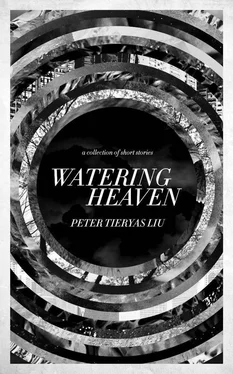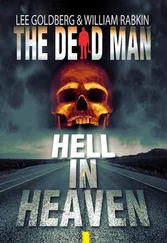Breathing hard, repletely depleted, she gripped me by the arm. I instinctively pushed her away and part of her shirt tore, revealing a nasty scar that ripped across her shoulder. It startled me. She quickly covered it. Then led me to a room to cast my hand in clay. We didn’t speak for thirty minutes. After the clay had solidified, she led me out to the front door.
“What happened to you?” I asked.
“I wanted something so badly, I tried to destroy it when I couldn’t have it.” She clutched her shoulder, a trace of pain whisking by her eyes.
“Will I see you again?” I wanted to know.
She slammed the door shut.
I stumbled outside in a daze. Couldn’t see anything. I bumped into a car, nearly crashed into several boxes. My ears died, my nose became clogged, my tongue paralyzed. I could feel the cartography of my bitterness etched into the mountain ranges of envy, see all my life clear as a film flash and how crudely incomplete it was. I was the Buddha of no parts. And the sea that hid me had vanished like my anonymity.
It wasn’t the lanky cigarette or the weathered black heels on the stranger that reminded me of Sue Lian. It was the wispy puffs of hair curling down her ear, her fleshy lips fading into an insouciant sheath of pink. Millions passed through the Beijing subways every day and I only saw this woman for a glance between stops. But that was enough to remind me of Sue Lian’s torrid touch, her withering sarcasms, her caustic glower that sundered titanium into granules.
I was a granule when I met first met the love of my life, unconsolidated, uncommitted, unsophisticated. After her, I was a granule cut in half, tossed about by market vendors, boiling with sweet potatoes and rice cakes. Everyone in the subway had an intricate recipe for their complexion: a squat woman yelling prices for magazines from her column in the subway; a young dilettante reading four books in four different languages while wearing his purple hair like a hat; three poets chewing greedily on pastries and commiserating over the misery of joy and the bliss of sorrow. I put my bag through security check, the debris from my debilitated soul hidden from their scanners. The subway routes were labyrinthine and the Mandarin directions, difficult to decipher. If you weren’t going anywhere, it was impossible to get lost. But even though I had no destination, I felt tentacles clawing through my pupils, a spider web the size of Beijing spindled together by the arachnids of industry and imagination.
My imagination died the day Sue Lian was struck with motion blindness. The savage histrionics of winter wind in Beijing blew a loose piece of construction straight into her head, knocking her unconscious. When she woke up, anything that moved refused to register in her visual cortex. Friends and family became phantoms, and the love of her life was the invisible man viewed in disparate frames. She couldn’t see me in motion and our desires became frozen in the strata of memory, carbonic fossils stuck between the Triassic and Jurassic. Walking together was a march to confusion, dance was a gyration of madness, sex became an aberration of the senses. She just wanted to stand still, me by her side.
I couldn’t, even without direction. I stumbled sideways, sprinted backwards; I swam through polluted ether and imbibed bitter gasoline. Kinetics had sabotaged my serenity and my heels kept on flipping askew. Sue Lian dealt with it by closing her eyes and re-experiencing Beijing through smell: the pores of sweat, the unsanitary sanitation of public toilets and charcoaled skewers roasting mutton and pork fat. She sucked on the fumes of the ubiquitous cabs and ignored the fireworks of vermilion pillars piercing the air. Buildings blinked at their veins, silver skyscrapers raced with dull gray apartments blemished by a familiarity that led to apathy. I saw a hundred talk bubbles above the invisible comic panels for our graphic novel of love, her bartering aggressively with a twelve-year old girl for a fake Gucci bag, the insistence on imitating every animal noise she heard. She ate a million snacks between midnight and 3 a.m., and we attempted to exterminate moths resting still in our closet while laughing at the futility of utility in affection. I loved her dumbly and she loved me with a keen intelligence that could have taught a tortoise how to dance on top of a flea.
It was my obstinacy that led to the sight I hated above all, the weak crinkling and the struggle against expression in her plaintive eyes as she realized she was no longer loved by the man she loved. Her illness made her too strange, a chasm cauterized into the hutong between us. In the days that followed, I drifted through the city. I felt like I was back at Tiantan Park watching the specter of a woman: elegant, turquoise dress, dancing beautifully by herself, hovering from one prospective partner to another, trying to find someone to accompany her but finding herself alone. All of the comforts of Beijing seemed alien without Sue Lian.
One year after our separation, I was still adrift. I had to meet this stranger even if just to soak in the last vestiges of voluntary amnesia. I pushed past the families with their duffel bags holding everything they owned. I fought against a deluge of passengers swarming into the train. I waded through a billion strangers to find one, remembering the end, teleporting from one emotion to another. “You’re picking on peanuts in the kung pao chicken,” she’d said. “Ivory chopsticks just won’t do.” I knew she was trying to reach me, trying to mend our broken satellites. But I hardened my will, convinced myself she was petty, self-absorbed, projecting my frustrations onto her, fighting campaign after campaign for my tawdry pride. If I could go back and rebuild the tracks, send the subway along a different route, everything would unwind and disentangle. The destination would be clear.
But that was when I felt a sharp sting in my brain and winced. I raised my head, realized I’d caught motion blindness. I blinked and Sue Lian was gone. I blinked again and the stranger was gone. I blinked one last time and the entire world evaporated, Beijing an empty train station with decrepit tracks.
All I had left were moments.
I.
My obsession was listening to other people’s phone calls. I spent my mornings thinking about all the things that would never be, life being that series of conversations over coffee and Coke and phone booths. Past subway rails and empty picnic tables and torn school books. All the other stuff was filler, never the fulfillment of one’s ravenous lust that consumed like a Neanderthal run amok. I stood and listened to people screaming into their cell phones, lonely whispers outside phone booths, pressing my ear against a glass box or waiting in line for unwanted calls. I didn’t try to remember names, a Jake or a Jenny or a Jane. Heard a girlfriend asking a boyfriend why he no longer loved her and a boyfriend asking a girlfriend why she no longer loved him. I traveled from street to street, waiting next to obsolescent phone booths, collecting what people said, a connoisseur of eclectic conversations.
It all began on a day I woke up late because I’d received a phone call telling me an old friend had passed away. My wife of four years was sleeping in a separate room. In the morning, I slept through the alarm, eventually got up and showered. Even though my wife had been out of a job for a year, she was gone, her bed neatly set up. There was a phone call. I picked up expecting my boss. Someone asked for my wife.
“She’s not here. Who’s this?”
He remained silent. Then hung up.
Later, during dinner, I remembered a time as a teenager when I’d gone to a friend’s house. As her parents ate, they didn’t say a single word. The mother served the food; the father read the newspaper. It was an act that played out every night, same time, same place without variance. I swore I would never be like them. But here I was — my wife reading some obscure cookbook; me, mute. When we’d met, we were like two sailboats in a fleet of ocean liners, our sails torn asunder, anchored together by the stratifying mishaps of ritualized tedium. Routine was the breeze that drove us forward, cynicism tethering our hulls together. Even after thousands of conversations, I was struck by how little we actually knew each other. The poverty of dialogue and the inability of our words to sate either of our appetites for companionship left us famished and lonely. It was hard for me to filter through the present coldness to one that had once smiled, lit up at the sight of me.
Читать дальше












